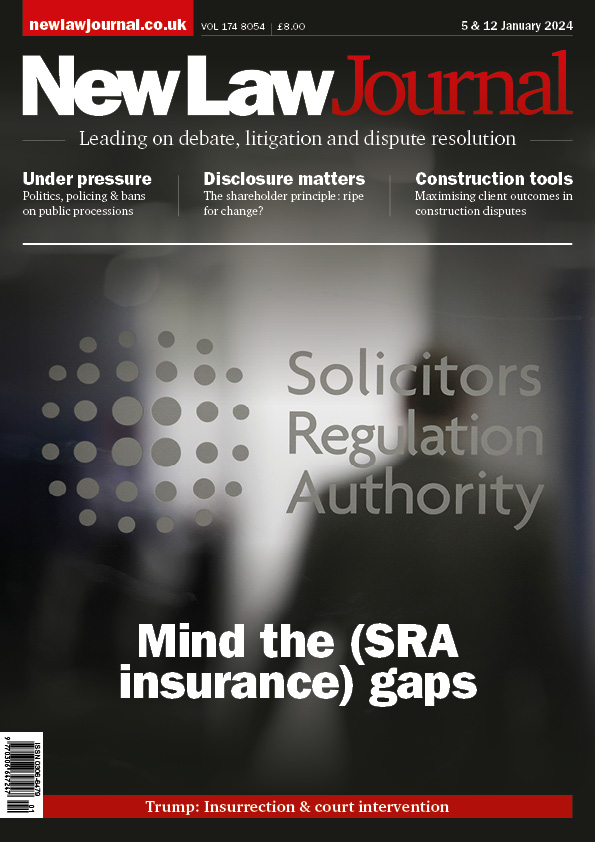THIS ISSUE

A resolution worth keeping…spotting gaps in your firm’s insurance policy. Frank Maher sets out where you might slip up
Curbing workplace sexual harassment: Mini Chandramouli compares approaches in the UK & Australia
Asli Yilmaz suggests strategies for maximising client outcomes in construction disputes
Roger Smith attempts to escape the law by turning to agrarian pursuits
Nigel Clark looks forward to some radical change in 2024
In the wake of the rise in shareholder activism & the recent decision in G4S, Lois Horne discusses disclosure & the shareholder principle
Will Trump be stopped from standing? Michael Zander on the Colorado Supreme Court’s decision
Neil Parpworth reflects on the former Home Secretary’s controversial conduct in relation to the policing of processions
Nigel Clark, director and shareholder at Nexa, a platform for consultant solicitors, proposes a change of approach on client fees, billing targets, the partnership model and long-hours culture, in this week’s NLJ
MOVERS & SHAKERS

Jurit LLP—Caroline Williams
Private wealth and tax team welcomes cross-border specialist as consultant
.tmb-mov69x69.jpg?sfvrsn=961ae4db_1)
HFW—Simon Petch
Global shipping practice expands with experienced ship finance partner hire
95ca96e3d47f4eff8d147c4f0df17c77.tmb-mov69x69.png?sfvrsn=3db5d86b_1)
Freeths—Richard Lockhart
Infrastructure specialist joins as partner in Glasgow office
NEWS
Talk of a reserved ‘Welsh seat’ on the Supreme Court is misplaced. In NLJ this week, Professor Graham Zellick KC explains that the Constitutional Reform Act treats ‘England and Wales’ as one jurisdiction, with no statutory Welsh slot
The government’s plan to curb jury trials has sparked ‘jury furore’. Writing in NLJ this week, David Locke, partner at Hill Dickinson, says the rationale is ‘grossly inadequate’
A year after the $1.5bn Bybit heist, crypto fraud is booming—but so is recovery. Writing in NLJ this week, Neil Holloway, founder and CEO of M2 Recovery, warns that scams hit at least $14bn in 2025, fuelled by ‘pig butchering’ cons and AI deepfakes
After Woodcock confirmed no general duty to warn, debate turns to the criminal law. Writing in NLJ this week, Charles Davey of The Barrister Group urges revival of misprision or a modern equivalent
Family courts are tightening control of expert evidence. Writing in NLJ this week, Dr Chris Pamplin says there is ‘no automatic right’ to call experts; attendance must be ‘necessary in the interests of justice’ under FPR Pt 25






